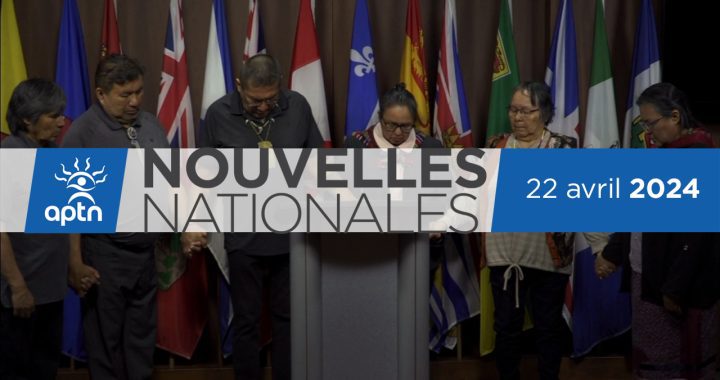An Indigenous teenager who was held in a windowless basement in a Montreal group home is set to file a complaint with the Quebec Human Rights Commission,according to an agency helping him.
The decision to file a complaint follows information obtained by APTN News in an access to information request that has raised issues with how the basement incident at the youth protection agency was investigated.
“I want respect, I want dignity, I want security,” said Charles, whose real name can’t be used because of his age and Quebec’s privacy laws. “I’ve decided to go public now and ask for help now because I realize that what they did to me was not right.”
Last May, Charles was put into COVID-19 isolation at his Montreal area group home.
He was placed into a windowless basement room and told he’d be there for 14 days.
This was because he went to school, found out it was closed due to a nearby bridge closure and didn’t immediately return back to his group home.
“I’m a teenager. I just wanted to do something else than be at a group home where I’m probably not going to be allowed to do anything for the whole day,” explained Charles, who says he was away from the group home for about 12 hours.
At the time, Batshaw Youth and Family Services, the youth protection agency that runs Charles’s group home, said they made the decision to place Charles in 14 days of isolation using a protocol based on “an algorithm”.
According to an incident report obtained by APTN through an access to information request, among the determining factors were, “Montreal was considered a red zone” and that procedure dictates that even for an asymptomatic youth “the 14-day Isolation [sic] is maintained to monitor any changes to the youth.”
When Charles’s teacher discovered the conditions imposed upon his student, he went public with it.
“You do not, in 2021, reduce a young Indigenous person to a number, and say ‘the algorithm’ told you to do it. It is a complete, utter failure in the system. And I would suggest a moral failure too,” said Charles’s teacher in May. APTN is hiding the teacher’s identity in order to protect Charles’s anonymity.
After media broke the story, emails obtained by APTN show that the Centre intégré universitaire de santé et de services sociaux (CIUSSS) de l’Ouest-de-l’Île-de-Montréal, (the public health agency that oversees Batshaw) ordered that Charles be given a COVID-19 test and moved from isolation if it came back negative.
Charles says he spent nearly six days in isolation in a windowless basement – including three days where he was not allowed outside at all.
“For the first three days I did not have access to my cell phone, my school computer, and I only had some access to DVDs at all times. I did not have any privacy due to the glass wall with the door. There were tiny curtains but they were open so they could see me,” said Charles.
The investigation report into Charles’s isolation says that he was placed in the basement because there was a lack of other unoccupied rooms.
It also describes the glass wall as a benefit because it “…allowed for a lot of access to the sun from the hallway.”
It also says Charles “…had access to his personal computer” as well as ” … books, yoga mates [sic] and art supplies.”
Charles said he was only offered books and DVDs.
He added that when he was interviewed for the report, he wasn’t explained his rights, which is why he declined to make a complaint at the time.
Now seeing what he calls inaccuracies in the report, Charles has asked a civil rights advocacy group, the Center for Research-Action on Race Relations, to make a human rights complaint on his behalf.
Fo Niemi, executive director of the centre describes the investigation as “misleading”, “superficial”, and lacking transparency.
“There’s nothing that we believe can justify the way that he was treated,” he added. “Young people have constitutional rights, I can’t believe how a state agency that’s supposed to look after young people for their well being and the best interests of the child can engage in these practices.
Niemi and Charles only became aware of the report’s findings after APTN forwarded it to the teacher who made the original complaint.
“Usually when you interview witnesses in an investigation of this kind, you have to outline how the process works, what their rights are, what their responsibilities are and at the end what will happen once an investigation is completed,” says Niemi, who wants an new independent investigation into the incident “Somebody has to be held personally responsible for this mistreatment.”
For Charles, the hope is that no one needs to go through the same treatment.
“I worry about the other youths who might be treated like this. I feel like this is racism and it can’t be under the table no more,” he says.
The CIUSSS de l’Ouest-de-l’Île-de-Montréal declined to be interviewed for this story.
Batshaw Youth and Family services is already subject of a “request of inquiry” by the Native Women’s Shelter of Montreal regarding “practices that are deemed discriminatory” regarding youth protection and Indigenous people.
Earlier this year, a report from the Quebec Human Rights Commission also found the regional health authority overseeing Batshaw chronically violates Indigenous youth’s “right to education and the full development of their human and cultural potential.”









